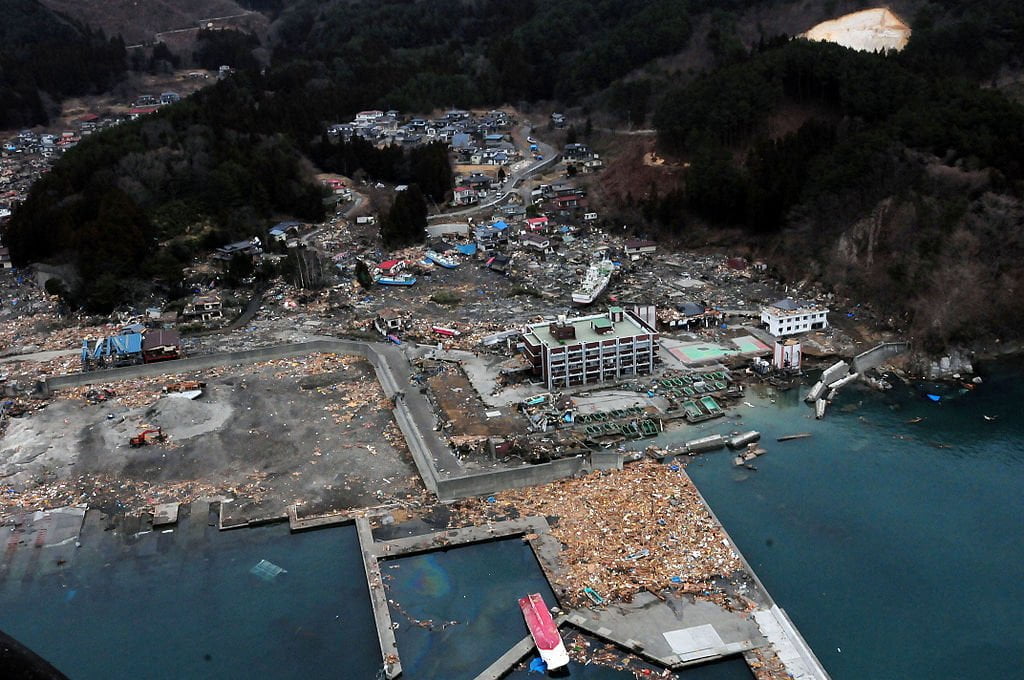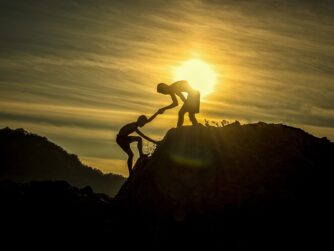Voice 1
Welcome to Spotlight. I’m Liz Waid.
Voice 2
And I’m Bruce Gulland. Spotlight uses a special English method of broadcasting. It is easier for people to understand, no matter where in the world they live.
Voice 1
In Japan, there is a place with a very strange telephone booth. The small building sits on top of a hill in the middle of a garden. It seems odd there among the flowers and other plants. It is far from the city, but many people come to use it. People travel here from all over Japan. Years ago, booths like this were common. But there is one thing that makes this booth different. The telephone inside does not work!
Voice 2
Local people call this telephone booth kaze no denwa. In English, it means “telephone of the wind”. Today’s Spotlight is on the telephone of the wind.
Voice 1
Itaru Sasaki is a retired steel worker. He built the telephone of the wind after his cousin died. He loved his cousin very much. And he was very sad when he died. Sasaki wanted a place to talk to his cousin, even though he was dead. He knew no one could hear him. But he hoped that talking would help him understand his deep sadness. In an interview with the radio program This American Life, Sasaki said,
Voice 3
“My thoughts could not go over regular phone lines. So I wanted them to be carried on the wind.”
Voice 2
Sasaki placed the telephone in his garden. When he became sad, he would visit the booth. He would talk into the telephone. He would tell his cousin how he felt. It made him feel better.

Voice 1
For a time, Sasaki was the only one who visited the telephone booth. But then, something horrible happened. On March 11, 2011, there was an earthquake off the coast of Japan. This was not a normal earthquake. It was one of the most powerful in over a century. The earthquake did a lot of damage in Japan. Even worse, it caused a tsunami – a huge wave. Tsunamis often begin from very large earthquakes under the water. Japan is an island in an area that has many earthquakes. So there are tsunamis also. The Japanese people thought their country was prepared and ready for any danger. They had built walls, and huge barriers on the coast to stop the damage. But no one alive had seen a wave this big.
Voice 2
In March 2011, the tsunami crashed into northern Japan. The water came over the protective walls. It destroyed homes, villages, and cities. The wave also damaged many nuclear power plants. One plant, Fukushima Daiichi, started to leak radiation. Many people who survived the tsunami still had to flee their homes. Even today, these people cannot return. Their homes, and the places they worked, are still full of poisonous radiation. Many thousands of people died in the tsunami. And even more are still missing.

Voice 1
The tsunami changed things for Sasaki. He lives in a town called Otsuchi. It is on the north-eastern coast of Japan. The tsunami destroyed most of Otsuchi. Some people tried to rebuild the town. Others just left. Life was not easy for them. Most people of the town knew someone who had died these. And the memories were very painful.
Voice 2
Sasaki knew how difficult these feelings were. He saw so many people struggling with their sadness. So he told them about his wind telephone. He let people come into his garden. They would use the telephone of the wind. He even put a notebook inside. Some people did not want to speak. But they could write about their feelings. Only a few people came at first. But soon, more people heard about the telephone. People from all over the country travelled to Sasaki’s garden. Some visited many times. The telephone booth became a special place. People would visit it to remember those they loved.
Voice 1
NHK is a Japanese television network. They made a film about the telephone of the wind. The film was called “The Telephone of the Wind: Whispers to Lost Families.” It was broadcast on the five year anniversary of the Tsunami. NHK recorded several visitors to the telephone. Some do not speak much. Other people speak just about their lives. They talk about their jobs, or their families. There are some people who cry. They express their sadness in the open.
Voice 2
In the film, one man walks into the booth. He is a young father. His wife’s name was Mine. His son’s name was Issei. His whole family died in the tsunami. So he is very sad. As he speaks, he begins to cry. He says:
Voice 4
“Dad? Mom? Mine? Issei? It has already been five years since the tsunami. If my voice reaches you, please listen. I do not know what I am living for. Issei, please let me hear you call me papa. I built a new house. But without all of you, it has no meaning. I want to hear your answer. But I cannot hear anything.”
Voice 1
Talking to people who have died is something many people do. Many people honor the memory of people they loved in similar ways. They visit cemeteries and talk at the place where the person is buried. Or they visit special places. This helps them remember the one who died.

Voice 2
But the telephone of the wind has become very special to many Japanese people. For many, the places they would visit are gone. The tsunami destroyed these places. The telephone of the wind provides a special place for anyone who wants it. It gives people the chance to express their emotions. It lets them know they are not alone.
Voice 1
In the NHK film, a mother and her children visit the telephone booth. The mother lost her husband in the tsunami. She begins to cry in the booth. She is sad that she will never see her husband again. And the booth helps the family to talk about him. As she leaves, the mother tells her children:
Voice 5
“We were all so sad. We did not think we could make it through. And that is why we never talked about Dad until now. But talking to him on the telephone today, it changed something.”
Voice 2
Have you ever lost someone you loved? How did you deal with that loss? Is there a special way that people mourn the dead in your culture? You can leave a comment on our website. Or email us at radio@radioenglish.net. And find us on Facebook – just search for Spotlight Radio.
Voice 1
The writer of this program was Dan Christmann. The producer was Michio Ozaki. The voices you heard were from the United States, the United Kingdom and Japan. All quotes were adapted for this program and voiced by Spotlight. You can listen to this program again, and read it, on the internet at www.radioenglish.net. This program is called, “Telephone of the Wind”.
Voice 2
We hope you can join us again for the next Spotlight program. Goodbye.
Question:
Have you ever lost someone you loved? What did you do? How do you deal with the loss?








It’s so painful to hear this emotional and sad story. I cried when I read this story although I had already listened to it before. Hope everyone who we love always stay with us.
It’s a bad idea to keep those people near with us. You have a memory and you had a time with those people or person so it’s the best regard and that’s enough.
i really like this topic
This story is very bad. A tsunami is scary. It destroys the life of many people. The telephone of the wind looks crazy but it helps many people have an easier life after disaster.
Yes, actually I lost my father and my uncles before 4 or 5 yaers. In my religion (Islam) there is one way to deal with it, and that is to pray for them mercy and forgivenes. Also we can visit graveyard.
If we lose a person dear to us, we ask God for patience and prayers for him and to pay alms on his soul.
The dead is the most painful thing has ever exist I hope everyone can be strong,also in my religion (Islam)we should be painted and pray for them
Actually I did’t loss anyone yet but I will cuz every one is going to day and that’s a sad thing but we have to except it that’s the way of life
The subject very sad, because the lost for any one it’s herbal thing and for them sociology, almost must dealing either way to remember that good and smile for reamarble think nice moments for them
No there is not
Yes I loved someone .
Iwas crying.
Iwas so sad.
Yes I have lost my grandpa the father of my mother last year it was in January, it was at 10 in the morning and my mother was relaxing in her bed because she has just came back home from visiting him in another country it was shocking as I was the first one to know about his death out of my family. I was in the bathroom as my brother who was living in the same country of my grandpa called me on the telephone and told me to give the phone to my parents but I asked him first what is going on and does he want to tell them and he said that my grandpa has passed away i immediately got out of the bathroom and woke up my parents and told them my father couldn’t handle it as my grandpa was so dear to him and he laid on the ground breaking down silently and my mother was in pure shock she then was starting to get calls from people and was crying alot and breaking down saying she felt in her heart that there was something is going to happen to him as I saw her and the way she cried I immediately started to cry with her as seeing her that way has heavily affected me on a personal level because he was also a special person to me and I hadn’t seen him since 2019 and I was impatiently excited to meet him this year finally but then the bad news just hit me in the face on the first month of the new year of 2022 it was a bad day. Nevertheless it was one of the few days that me and my family as a whole and sum of it all members bonded and got along with eachother
yes, I have lost the people I love so much ,and the only way i can do to decrease my sadness is to visit their cemeteries and then greeting them and praying for them
I lost my mother when I was 8years old and I prayed allah to forgive my mother and I deal it through patient and that is what I could
This story is full of sadness, that event I think until now it is in their minds. Ok that’s not easy we can’t forget what is over and who we lost it because it’s realy difficult thing. I hope tsunami don’t returns again.
If we could understand the pain of others as we understand our own pain, we would become better people, there would be no more wars in the world and we would all help each other like brothers. What I find incomprehensible is seeing politicians who seem to be only concerned with the citizens of their own country and are completely indifferent to the lives of others.
In our culture or rather in our religion ,there is many ways to mourn our deads , such as visit cemeteries and read quran at the place where the person is buried and pray for his mercy ,or do angoing charity in their name like donating to build mosques, schools, and digging wells.
Thankfully I didn’t lose someone I love him , and I wish never Lose someone